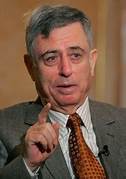Abdul Halim Khaddam, the former deputy to the Syrian president, believes that Tehran realizes the fall of the Syrian President Bashar al-Assad’s regime would lead to its own downfall. However, he ruled out Iran getting involved in a war for Assad.
Khaddam stated, “Iran is concerned about the fate of the regime in Syria, and the Iranian leadership understands that the fall of the regime will lead to its own fall… As for what Iran will do to support Bashar al-Assad, it has done what it can, and therefore, it will not engage in a war for him because it knows that getting involved in the war will have serious consequences.”
Today, Khaddam revealed ongoing consultations internally about forming a structure that supports the revolution and works to achieve its goals in two stages: first, working to overthrow the regime, and second, managing the country after its fall within a few months.
He added that the tasks of this formation during the transitional phase would include issuing decisions and laws and taking measures aimed at unleashing political freedom in all areas, including the freedom to form political parties, release media freedom, and repeal all exceptional laws conflicting with human rights laws, allowing the return of Syrians residing abroad.
Regarding the Russian stance on Syria at the Security Council, Khaddam said, “Russia is playing a role that will be detrimental to its future interests in Syria and in the region, and it is doing so under the delusion that the regime will continue… I believe that ultimately Russia will not be able to resist the increasing pressure from both the international community and the Arab public opinion, and it will do as it did with Libya.”
Addressing the internal Syrian situation, he disclosed consultations taking place internally about forming a structure that supports the revolution and works to achieve its goals in two stages: first, working to overthrow the regime, and second, managing the country after its fall within a few months.
He added that the tasks of this formation during the transitional phase would include issuing decisions and laws and taking measures aimed at unleashing political freedom in all areas, including the freedom to form political parties, release media freedom, and repeal all exceptional laws conflicting with human rights laws, allowing the return of Syrians residing abroad.
Regarding rumors of disturbances within the army and the possibility of it evolving into a military coup, Khaddam said, “The movement of the Free Officers is a step taken by a number of military personnel within the framework of national work to save the country.” He added, “It is difficult to say the possibility of a military coup. The more likely scenario is the disintegration of the armed forces due to the national and psychological repercussions among the military, as many wonder where Bashar al-Assad is taking them. The word ‘where’ leads to another question: What is the action? Therefore, the army is approaching this situation for national, psychological, and material reasons.”


